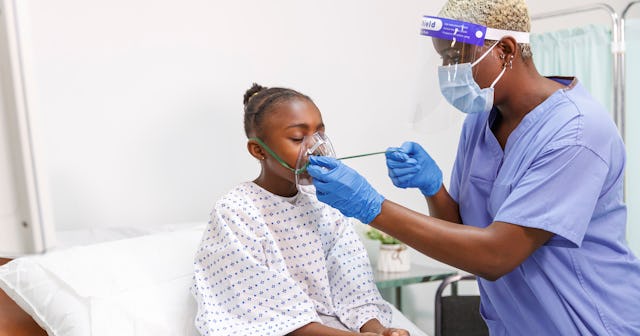Omicron Cases Are Dropping, Which Means Doctors Are Prepping For A Wave Of MIS-C Hospitalizations

It seems like the worst of the Omicron wave has passed, but doctors are gearing up for the next spike: an uptick in children hospitalized for the dangerous MIS-C
The Omicron variant has been especially challenging for parents, which says a lot, considering all of the compounded complications of navigating school safety protocols and unhinged parents spewing misinformation about the pandemic.
While the contagious Omicron wave seems to be winding down, medical professionals are prepping for what has become a pattern throughout the pandemic: the wave of multisystem inflammatory syndrome in children (MIS-C) cases after a variant’s peak. The condition, while rare, can show up weeks after a child has Covid-19 and lead to potentially fatal inflammation of major organs, including the heart, lungs, brain, and kidneys.
According to the Center for Disease Control and Prevention (CDC), roughly 4.5 million children have been infected with Covid-19 in January 2022 alone. Experts are still not clear on what exactly causes MIS-C, but there has been a correlation with MIS-C cases in children who had the Covid-19 virus.
“It always follows the same pattern,” Dr. Roberta DeBiasi, Infectious Disease Division chief at Children’s National Hospital in Washington, DC, told CNN. “It’s always two to six weeks after we see the spike from whatever variant it is, and then we’re on the lookout for MIS-C. And then, sure enough, it comes.”
What are the symptoms and causes of MIS-C?
MIS-C has an array of symptoms, and not every child who has MIS-C will present the same symptoms. Some of the symptoms of MIS-C include abdominal pain, vomiting, diarrhea, rashes, conjunctivitis, and low blood pressure.
These symptoms tend to present four to six weeks after the initial Covid-19 infection, and might even seem like a flareup of Covid itself. Doctors warn that if a child’s symptoms get worse, it’s time to get to the hospital, STAT.
“Children have died in the United States because they didn’t get to emergency rooms fast enough,” Dr. Jim Versalovic, the pathologist-in-chief at Texas Children’s Hospital in Houston said. On February 18, 2022, the Wisconsin Department of Health Services (DHS) reported the first death of a child with MIS-C associated with Covid-19.
Medical experts are still unsure as to what exactly causes MIS-C in some children and not in others, but it is worth noting that MIS-C often follows what doctors describe as mild or asymptomatic Covid-19 cases. MIS-C also tends to affect elementary school-aged children, most commonly 8- and 9-year-olds, although there have been cases in both older and younger children and young adults.
Studies show that the vaccine lowers a child’s risk of MIS-C
Some hospitals across the US have seen a lower amount of MIS-C hospitalizations, which many experts credit to wider vaccine eligibility for kids.
“The older kids are much less represented among the MIS-C cases now, and that makes sense because they’re vaccinated, and there are plenty of studies now showing that vaccination reduces the risk of MIS-C cases just like it reduces the risk of hospitalization and severe disease,” DeBiasi said.
A study performed by the CDC in January 2022 seems to back up this hypothesis. According to the study, vaccination reduces the likelihood of MIS-C by a whopping 91%. Of the adolescents in the study hospitalized for MIS-C, 95% had not received a full vaccination against Covid-19. Of the MIS-C patients that were vaccinated, none required life support.
Covid-Associated MIS-C is treatable if caught in time
Most children with MIS-C will need hospital treatment to recover and prevent any permanent organ damage, or worse. Pediatric intensive care units have been treating MIS-C patients with fluids for dehydration, oxygen if there is trouble breathing, steroid therapy, and other types of targeted therapies to reduce overall inflammation.
The good news is that children who were treated at hospitals for MIS-C at the beginning of the pandemic don’t seem to have any lingering side effects from the condition. According to a study by the American Heart Association, most children who receive professional medical treatment make a full recovery from MIS-C, even if they experienced an acute case.
Still, it is better to be safe than sorry, and doctors urge parents to have any eligible children vaccinated to lower their risk of having post-Covid MIS-C. There is still no vaccine authorized for children ages five and under, which makes having adults around younger children vaccinated even more vital.